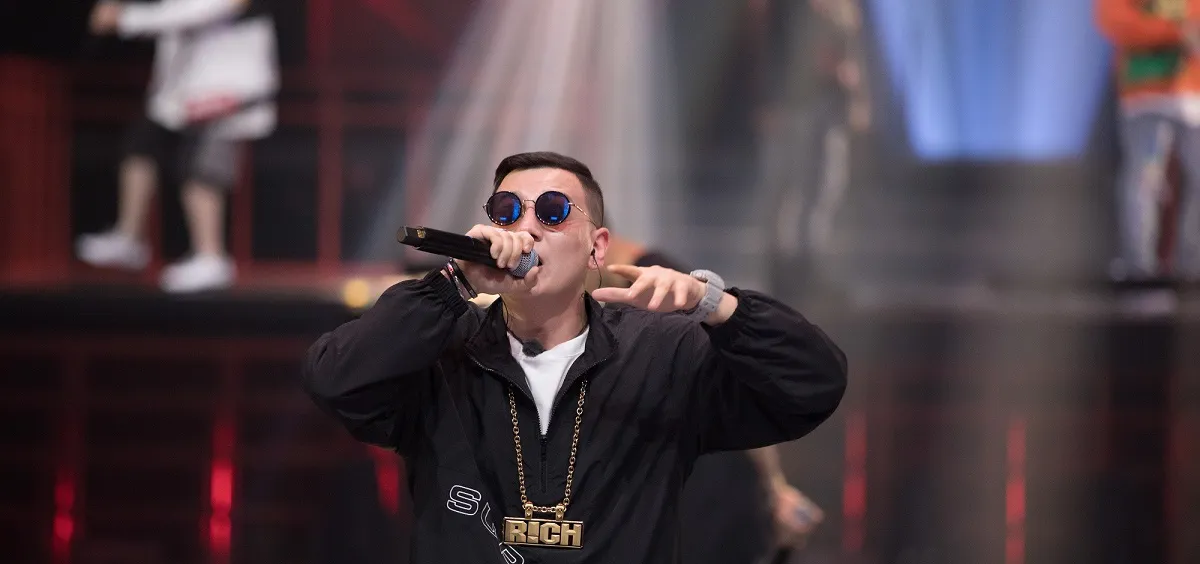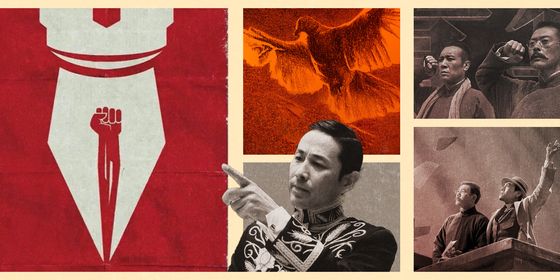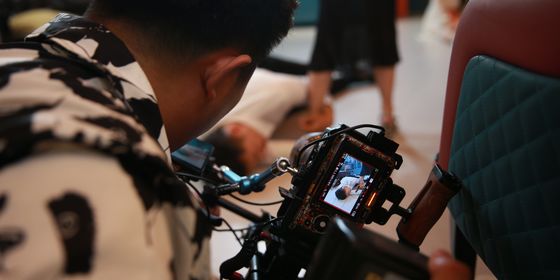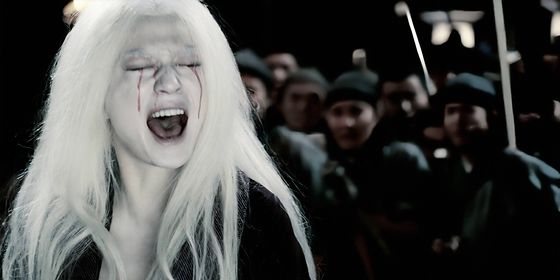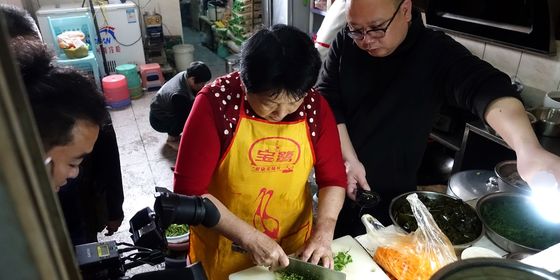In China’s regulated rap industry, dissing takes on patriotism, celeb-baiting, and other unique forms
“You can keep dissing yeah, I’m just going to increase the decibels,” blared Rap of China celebrity judge Kris Wu from an autotuned microphone during his performance with finalist Nawukere (那吾克热), also known as “China’s Eminem.”
As Nawukere’s assigned mentor on the show, Wu’s job was to make the Uyghur contestant from Xinjiang look good on stage, rather than take up over half of the song with a FX-heavy hook. Unfortunately, the song, “You’d Better Run,” meant as a warning to anyone who disses the duo, flopped with the viewers, causing Nawukere to lose his lead to fellow Uyghur contestant—and eventual champion—Ai Re (艾热).
Dissing, a unique sub-genre of rap, is broadly defined as a song that rants or pokes fun at a particular person or institution—essentially, a creative verbal attack. In the US rap culture, a diss-off typically begins with one rapper taking offense at a remark made by another rapper on Twitter. The former will release a diss track, to which the latter responds with a diss track of their own, and the cycle repeats until there is a “knockout” diss track that leaves its opponent speechless (or until the public loses interest).
However, in China’s nascent—and government-monitored—rap industry, the concept of dissing takes on a whole new form. Here are the five peculiarities of some Chinese rap disses that would have Tupac turning in his grave.
Patriotism
Rap was conceived of by the African-American community in the early 1990s as a form of institutional critique, or dissing the ruling power. But while millions of American citizens have heard Kendrick Lamar diss Donald Trump, there is no knowing what would await the Chinese rapper rash enough to diss Xi Jinping or the CCP. Moreover, in an environment where a rapper’s success depends just as much (if not more) on government support as talent, transfiguring the originally subversive art form of rap into a “cool” government mouthpiece has become an easy way for Chinese rappers to earn a quick buck and get fast-tracked to fame.
Or, better yet, why not write a diss against institutions squabbling with the Chinese government? That’s what rapper Pissy did two weeks ago when he dissed Sweden, Swedish brands, and Swedish comedian Ron Dahl with a track called “Hey Sweden,” following an international spat involving Chinese tourists, Swedish police, and a racist comedy show. In the video, Pissy echoes state media critiques of Dahl, the inaction of Swedish government, and West’s double standards on human rights. He threatens Sweden not with guns, unlike the gangster rappers of old, but with “the power of the Chinese nation.”
Pissy is part of Chengdu Revolution, a quartet of rappers that have been propelled to fame by their patriotic rap. They’ve released singles defending China on the South China Sea issue, THAAD, and “Western media fabrication.” The group’s close cooperation with organizations like the Communist Youth League make them virtually un-dissable by any other rapper. However, many emerging grassroots rap artists in Chengdu reportedly try to avoid having any association with Chengdu Revolution.
Xenophobia
A close cousin of the above, this form of dissing is nevertheless truer to the subversive origins of rap. In May, Chengdu rapper Xie Di (謝帝) came into the spotlight after releasing the track “Gua Laowai” (瓜老外), or “Stupid Foreigner” (gua is a common insult in the Chengdu dialect).
While Chengdu Revolution’s lyrics read like a drunken statement from the Chinese Foreign Ministry, Xie Di’s lyrics actually pack the punching power and catchy hook imperative to a good diss:
Today, an English teacher, yeah
Tomorrow, a young entrepreneur, yeah
But the day after that, what will you be?
The theme of this diss is a win-win; it reflects the anger many ordinary Chinese feel at entitled foreigners living in China, while still containing the necessary patriotic overtones to appease the censors in spite of the violent imagery (Xie Di uses a club to beats a mannequin’s with gua laowai written on its head), gangster-like posturing (a middle finger is held up every two seconds), and tattoos. Rather than getting discredited like his Youth League-associated colleagues, Xie Di has only solidified his status as one of Chengdu’s finest.
Picking on the strong
As a hyper-aggressive form of musical competition, diss-offs between rappers can often go viral, especially when the feud is between two big names in the industry. The recent spat between Machine Gun Kelly and (the original) Eminem is a good example: the former’s diss track drew 130 million within two weeks while the latter’s response broke YouTube’s record for most plays in its first 24 hours, amassing 38.1 million views. It was under this logic that Rap of China producers actively escalated the feud between Season 1’s co-champions PG One and GAI.
A more recent phenomenon, though, involves relatively unknown Chinese rappers dissing popular contestants on the show to gain publicity. Self-labeled “independent musician” Toxic (西米) jumpstarted a small Weibo following two weeks ago when he released his first big hit: a diss against none other than Nawukere.
Toxic followed diss conventions to the letter; the controversial single cover depics a sniper scope of Nawukere’s face, an imitation of the cover for Eminem’s Machine Gun Kelly diss “Killshot”; Toxic gets super personal, mocking Nawukere’s self-portrayal as someone who endured years of poverty for his rap career; a few disses of Wu and his catchphrase, “skr,” are also thrown in.
The strategy worked—the track has registered over 4.4 million views on Weibo, and 400,000 views on YouTube—though the online commentary was largely negative.
“Diss Nawu? Take a shower and go to bed little boy”
“This diss sounds like the work of a kid in kindergarten”
Things then got meta, when rapper Yang Hesu dissed Toxic’s diss track with a track called “Don’t Diss”.
Although Yang Hesu is already a household name in the Guangdong rap scene, with over one million followers on Weibo, he surely isn’t complaining that “Don’t Diss” has over 1.2 million views on Weibo.
Although Nawu hasn’t responded to Toxic with a track of his own—which would surely draw more attention to the young up-and-comer—his performance in the Rap of China season finale, a few days after Toxic released his track, was seen as an indirect response; “You’d Better Run” is Nawu’s only song dealing with haters, and he even talked about being “criticized in the rap circle” during the post-performance speech. Emboldened by his trainee’s words, Wu jumped in, declaring to audiences that despite everyone questioning his authenticity, he and Nawu won’t be leaving the hip-hop game soon.
Picking on the weak
While netizens gasped at Toxic’s audacious take-down of Nawu, diss magnet Kris Wu has modified the genre in his own way. At the end of July, Wu got into a spat with online sports forum Hupu for circulating an audio file that purports to show the Chinese-Canadian idol’s tone-deaf singing. In response, Wu released a track in which he raps without the autotune he uses in most of his performances, including those on The Rap of China.
Although Wu plays up his courage, saying “even though there are many [Hupu users], I’ve never been scared, we’re not on the same level skrrr,” it’s clear that Wu’s Hupu critics do not have the resources to respond to his diss in kind. Even more tellingly, Wu hasn’t responded to a diss by rapper AR in a track titled “The Emperor’s New Clothes” (皇帝新衣).
One could also argue, though, that an experienced rapper like AR taking on Wu isn’t really fair game. Luckily, Rap of China Season 1 champion PG One stepped in defense of the celebrity mentor a week after the incident, releasing a track called “Super Saiyan,” in which he criticizes underground rappers that make money from disses, adding a few “skrs” in support of Wu.
But PG One also had an axe to grind; namely, reviving a rap career that had been destroyed by government scrutiny and an affair with a married actress.
Do what you diss
Hypocrisy seems to run deep in Chinese diss culture. It was recently revealed that Toxic, for all his anti-establishment posturing, had participated and failed to qualify in the preliminary auditions for Rap of China.
This season’s Rap of China also featured contestants who had dissed the show in the past. Shanghai-based Al Rocco, who made it to one of the final rounds this year, had been dropped in the first episode of Season 1 for not being able to rap in Mandarin. At the time, he released an English-only diss titled “The Rap of China Diss,” which had lyrics like “iQiyi you ain’t got to hip-hop”.
There were no hard feelings, though: This year, upon his return to the show, he thanked the judges for giving him the motivation to improve his Mandarin, then went on to ace his 60-second performance. Luckily for Rocco, his all-English diss had flown well under the radar of Chinese social media, and no one has dissed him for being a sell-out…yet.





